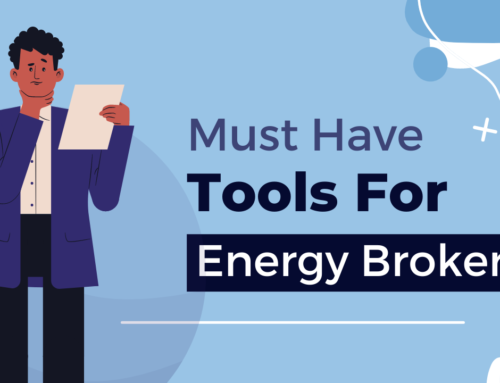If you live in a state with deregulated energy, then you might be wondering if energy deregulation is good. And, if you operate a business, then you might be wondering the same thing about energy brokers. There are many different types of energy brokers selling energy in deregulated states, and in this article, we will outline the signs of a legitimate energy broker and the red flags to watch out for and avoid.
What Do Energy Brokers Do?
Business energy brokers act as liaisons between retail energy suppliers and commercial customers located in deregulated energy states. To understand the ins and outs of energy brokers, it’s best to consider the services they offer their customers, including:
Rate Shopping
First and foremost, energy brokers help their customers find better rates for electricity and natural gas supply. In deregulated markets, there are a multitude of energy suppliers offering various rate plans with different terms. Finding and vetting suppliers can be quite complex for the average business owner as there are many different licensed suppliers, and their rate offerings are not always easy to find. In fact, in the commercial and industrial markets, most suppliers do not advertise their prices online but rather offer custom-quoted plans. It takes knowledge, relationships, and expertise to be able to gather multiple quotes from suppliers. This is the main function of an energy brokerage company.
Contract Negotiations
Energy contract language can be quite complex. With clauses such as material change, pass-through adjustments, auto-renewal contracts, energy bandwidth allotments, and post-term rate calculations, the average customer does not have the legal expertise to fully understand and negotiate these terms. An energy broker can act as your representative and negotiate favorable terms based on your business’s energy load profile and usage patterns.
Usage Analysis
One of the key steps in negotiating the purchase of energy is understanding how business energy consumption is calculated and what data suppliers use to determine price quotes. Numbers such as load factor play an important role in calculating the cost to supply a customer, and having an energy broker in your corner to verify supplier calculations is critical for your success. Your broker should help you understand your usage and make suggestions for adjusting consumption patterns for more favorable price outcomes. For example, with the recent increase in PJM capacity prices, businesses that implemented peak load-shaving strategies last summer are benefiting from a reduction in cost.
Cost Forecasting
Another key service offered by experienced energy brokers is cost forecasting based on your new rate offer and historical consumption data. After all, your energy rate means nothing unless it can be quantified into an anticipated expense item. Brokers can compile cost proformas that will project your annual energy expenses based on supplier rate plans.
Market Monitoring
After you’ve enrolled in an energy plan, it’s important to continually monitor energy futures prices to ensure your budget for the years to come. The energy markets can be quite volatile, with geo-political and global events affecting the market. Recent consequences, such as the Russia-Ukraine conflict, have had an overwhelming effect on U.S. natural gas prices. Staying on top of market trends is yet another valuable service offered by a good energy broker.
Contract Management
Finally, it’s important to manage your existing and future energy contract renewals in a simple way. Nothing is worse than forgetting to renew an energy contract and having your rate double after the contract expires. Energy brokers provide contract management services to ensure that you renew your contracts on time as well as storing vital data regarding your utility accounts.
Are Energy Brokers Licensed or Regulated?
Energy brokers are regulated by state Public Utility Commissions or Public Service Commissions. In most jurisdictions, brokers are required to obtain a license and commit to some sort of financial bonding in order to sell energy. Here is a list of the current deregulated states and their licensing requirements for brokers:
| State | License Requirements |
|---|---|
| Connecticut | License Required |
| Delaware | License Required |
| Maine | License Required |
| Maine | License Required |
| Maryland | License Required |
| Massachusetts | License Required |
| New Jersey | License Required |
| New York | License Required (recent) |
| Ohio | License Required |
| Pennsylvania | License Not Required |
| Rhode Island | License Required |
| Texas | License Required (recent – registration only) |
| Washington D.C. | License Required |
Financial Responsibility
Most states, such as Pennsylvania, New York, New Jersey, and Maryland, require energy brokers to prove their financial viability and to assume some sort of financial responsibility for their services. Pennsylvania, for example, requires energy brokers to post an annual $10,000 bond. Recently, New York changed their energy broker license requirements through NY State Senate Bill 2021-S9414. This bill requires brokers to post a $100,000 or $50,000 letter of credit with the New York Public Service Commission (PSC). On the other hand, the state of Texas has a simple broker registration process and does not require any financial bonding or commitment from brokers.
It’s best to check your state’s guidelines to ensure the broker with whom you are working is fully compliant, licensed, and bonded if necessary. These regulatory steps help to protect consumers from bad actors and hold energy brokers accountable for their actions.
How To Spot A Legitimate Energy Broker
There are many energy brokers and energy broker organizations that conduct business in a professional and legitimate manner. Understanding the characteristics of a legitimate energy broker is critical when deciding what type of energy broker to hire. Here are some of the good signs you should be cognizant of when working with an energy consultant or broker…
Clear Explanation Of Their Fees & Services
When you use an energy broker to find you an energy supply rate, it is clear they are being compensated in some manner. If your broker is able to clearly articulate how they are compensated and what services they will deliver in exchange for that compensation, then you’ve found someone you can trust.
Provide Multiple Rate Offers
Be wary of brokers representing a single supplier. They could have a special commission arrangement worked out with that supplier, and you might not be getting access to the lowest price. A trusted energy broker will price your account with multiple suppliers in order to test the market and truly find the best rate plan for your business.
They Ask For Usage History
In order for an energy supplier to offer a competitive rate, they need to evaluate your business’s energy consumption. Brokers should collect recent bill copies or signed letters of authorization from you in order to accurately calculate your historical consumption data. Beware of brokers who present price quotes without analyzing your usage information first. This is a key indicator that you are being presented with an “off-the-shelf” rate that might not be best for your business.
A Track Record And Reputation Of Trust
Unfortunately, there are many “part-timers” in the energy broker sector. These are individuals who are trying to make fast money by using their personal connections to sell a product they do not know anything about. You don’t need to avoid a friend-turned-broker—but make sure they’re qualified. If your broker is able to show you case studies from other clients, references, online reviews, or prove that he has a good reputation among his past customers, then you might have found a “good one”. It is important to do business with professionals who understand their industry and are able to bring value to your organization, and nothing screams credibility more than positive stories from other businesses and customers.
Licensed & Bonded
A determining factor in separating legitimate energy brokers from the “fly-by-night” companies, is the status of their energy broker license and state bonding. Energy brokers in deregulated energy states are required to obtain licensure or register with the state PUC. If your broker is licensed, then he went through a heavy vetting process to prove his worthiness and credibility.
They Offer Ongoing Support
Great energy brokers do more than find cheap energy rates. Brokers should offer additional services after the sale such as utility account monitoring, dropped utility account management, energy contract renewal management, and market price monitoring. Be sure to ask your broker what additional services he or she will provide as their customer.
Red Flags: How to Spot Dishonest Energy Brokers
Transparency is a key ingredient in business. And, when you are hiring a business energy broker to negotiate your electricity and/or natural gas supply contract, then it is imperative to have transparency and honesty in your relationship. Here are some of the common signs to watch out for indicating that the energy broker you’re thinking of using isn’t as transparent as you thought…
Lack Of Transparency With Contracts
If your energy broker refuses to show you a copy of the retail energy contract and simply wants you to complete a DocuSign or signature line, then it is a big red flag! As a business owner, you should read and understand the contract language in every contract you sign. Unscrupulous energy brokers will use sales tactics to distract you from the details and get you to “just trust me and sign on the dotted line”.
Can’t Explain The Energy Price Components
In a fixed-rate energy supply contract, there are several price components that make up the total rate. For electricity, the major components are energy, transmission, and capacity. For natural gas, those components are gas, transport, and basis. If your broker cannot explain what exactly is included in the rate, then you should avoid doing business with him or her.
Unable To Explain The Terms Of The Contract
Every fixed-rate energy contract has a start date, end date, and terms outlining what happens if you do not renew. If your broker signed you up for a fixed rate but overlooked telling you the term length of the contract, it’s a big red flag! Remember, energy brokers make money off every unit of energy being consumed over the total contract period. So, the longer the contract, the more sales commissions for them. Now, that doesn’t mean that all long-term contracts are bad. In some cases, a longer-term agreement might be what’s best for you based on market conditions, but if your broker didn’t tell you the contract term, then stay away!
Brokers should also be able to explain the details of the contract including energy bandwidth clauses, potential pass-through charge adjustments, gross receipts tax application, and early termination clauses.
Looking For A Reputable Energy Broker?
Ready to work with a licensed, reputable energy broker? Diversegy is registered in all deregulated states and backed by a publicly traded energy company. Contact us today to simplify your energy purchasing strategy.



